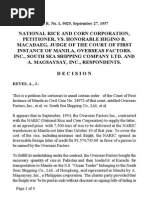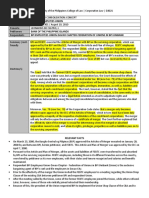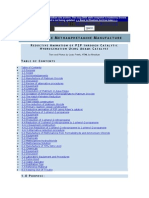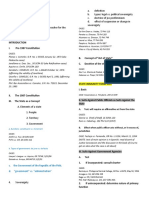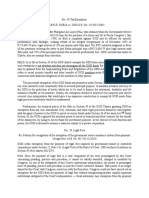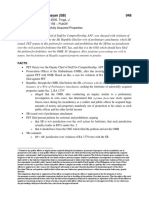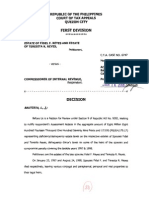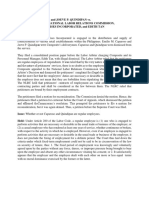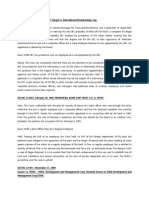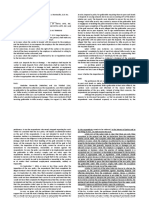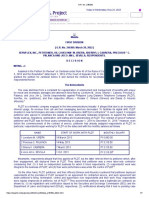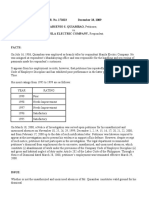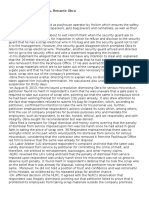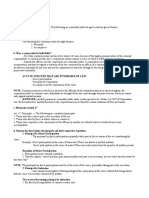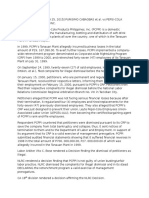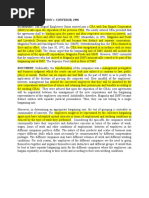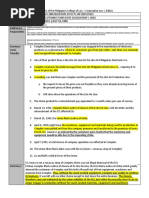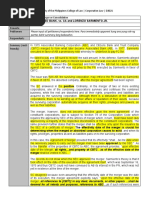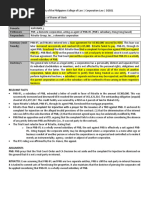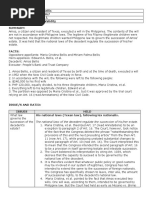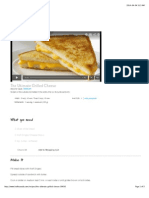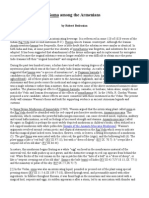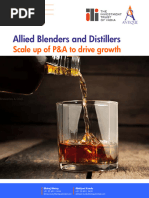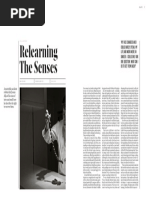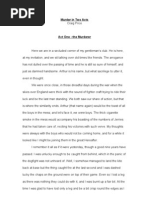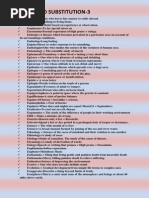271.pepsi Cola Distributors v. NLRC
271.pepsi Cola Distributors v. NLRC
Uploaded by
Sha SantosCopyright:
Available Formats
271.pepsi Cola Distributors v. NLRC
271.pepsi Cola Distributors v. NLRC
Uploaded by
Sha SantosOriginal Title
Copyright
Available Formats
Share this document
Did you find this document useful?
Is this content inappropriate?
Copyright:
Available Formats
271.pepsi Cola Distributors v. NLRC
271.pepsi Cola Distributors v. NLRC
Uploaded by
Sha SantosCopyright:
Available Formats
University of the Philippines College of Law | Corporation Law | D2021
Topic Merger and Consolidation - Effects on Employees
Case Name Pepsi Cola Distributors v. NLRC
Case No. & Date G.R. No. 100686 August 15, 1995
Ponente ROMERO, J.:
Petitioners PEPSI COLA DISTRIBUTORS OF THE PHILIPPINES, INC.,
Respondents NATIONAL LABOR RELATIONS COMMISSION, 5th Division, Cagayan de Oro City, HON. AMADO M. SOLAMO,
Labor Arbiter, Sub-Regional Arbitration Branch No. 10, Butuan City, and TERTULIANO P. YUTE
Summary Yute started working with Pepsi Cola Bottling Company of the Philippines (PCBCP) as a contractual
maintenance electrician sometime in 1979 and when petitioner, Pepsi Cola Distributors of the Philippines,
Inc. (PCD) took over the bottling company's manufacturing operations in 1981, he was absorbed as a regular
employee. Thereafter, PCD terminated Yute’s employment on the grounds of alleged abandonment of work
and/or absence without leave. Yute filed a complaint for illegal dismissal against PCD. Pending its appeal to
the NLRC, PCD reinstated Yute pursuant to the LA’s order. However, 33 days after he was included in the
payroll, PCD stopped payment of Yute's salary on the ground that it allegedly sold its business interest to
Pepsi Cola Products Philippines, Inc. (PCPPI for short). In resolving the case on the merits, NLRC modified the
decision of the LA, ordering both PCD and PCPPI to reinstate Yute or pay for his separation pay. PCD
maintains that its right to due process of law was violated considering that there was no formal complaint as
regards the second dismissal and no hearing was ever conducted to enable PCD to present evidence.
Moreover, the second dismissal of Yute was due to its closure as a result of business losses. PCPPI cannot also
be liable since it is a corporation separate and distinct from PCDPI, and is not a party to this case.
SC ruled that there was no grave abuse of discretion on the part of NLRC when it held both PCD and PCPPI
liable to Yute. The contention that the second dismissal of Yute presents an issue separate and distinct from
the issue of the earlier dismissal is nothing but an attempt of PCD to evade liability for illegally dismissing Yute
and to shield the purchasing corporation, PCPPI, from the said liability.
Doctrine/s The issue of whether or not (PCPPI) is liable for the illegal acts of its predecessor-in-interest PCD , as in the
instant case, has already been settled in the case of Pepsi Cola Bottling Co. v. NLRC. In said case, the PCPPI
claimed that it is a corporation separate and distinct from PBC or PCD, hence, it is not the proper party to
which the writ of execution of the decision in an illegal dismissal case filed against its predecessor-in-interest,
PBC, should be served; and that reinstatement is no longer possible since PCD closed down its business on
July 24, 1989 and the new franchise holder, PCPPI, is a new entity. SC ruled:
PCD may have ceased business operations and PCPPI may be a new company but it does not
necessarily follow that no one may now be held liable for illegal acts committed by the earlier
firm. The complaint was filed when PCD was still in existence. Pepsi-Cola never stopped doing
business in the Philippines. The same soft drinks products sold in 1988 when the complaint was
initiated continue to be sold now. The sale of products, purchases of materials, payment of
obligations, and other business acts did not stop at the time PCD bowed out and PCPPI came into
being. There is no evidence presented showing that PCPPI, as the new entity or purchasing company
is free from any liabilities incurred by the former corporation.
You might also like
- Dubai Law No.1 of 1971 Contracts LawDocument27 pagesDubai Law No.1 of 1971 Contracts Law徐金旭No ratings yet
- NARIC v. MACADAEG G. R. No. L-9025 - September 27 - 1957Document4 pagesNARIC v. MACADAEG G. R. No. L-9025 - September 27 - 1957poppo1960100% (2)
- Manlimos V.NLRCDocument4 pagesManlimos V.NLRCSha Santos100% (2)
- in The Matter of The Intestate Estate of Reynaldo G. Rodriguez v. RodriguezDocument2 pagesin The Matter of The Intestate Estate of Reynaldo G. Rodriguez v. RodriguezSha SantosNo ratings yet
- BPI v. BPI Employees UnionDocument4 pagesBPI v. BPI Employees UnionSha Santos100% (1)
- Your Guide To Oslo: Made by Locals / No-Nonsense / Not CommercialDocument43 pagesYour Guide To Oslo: Made by Locals / No-Nonsense / Not CommercialTarciney CaldasNo ratings yet
- HW Elem TRD Skills Test Answers JGHDocument3 pagesHW Elem TRD Skills Test Answers JGHjust english100% (3)
- Large Scale Methamphetamine Manufacture by RhodiumDocument31 pagesLarge Scale Methamphetamine Manufacture by RhodiumIgor Consoli Wandscheer100% (2)
- Philippine Pizza, Inc. v. Cayetano PDFDocument8 pagesPhilippine Pizza, Inc. v. Cayetano PDFAnnieNo ratings yet
- Consti 2 Syllabus SummaryDocument5 pagesConsti 2 Syllabus SummaryJean C. MatiasNo ratings yet
- Corp de Rossi V NLRCDocument5 pagesCorp de Rossi V NLRCMegan ManahanNo ratings yet
- Benitez V Santa Fe Moving and Relocation SevicesDocument4 pagesBenitez V Santa Fe Moving and Relocation Sevicesbrendamanganaan100% (1)
- Cases GsisDocument10 pagesCases GsisKateBarrionEspinosaNo ratings yet
- LL 11 - de Leon v. NLRC 100 SCRA 691Document12 pagesLL 11 - de Leon v. NLRC 100 SCRA 691raikha barra0% (1)
- Airborne Maintenance and Allied Services Inc. vs. Arnulfo M. EgosDocument2 pagesAirborne Maintenance and Allied Services Inc. vs. Arnulfo M. EgosMonyeen SesanteNo ratings yet
- Villavilla Vs CADocument6 pagesVillavilla Vs CABobby ParksNo ratings yet
- Eagle Ridge Golf & Country Club v. CADocument2 pagesEagle Ridge Golf & Country Club v. CANicole KalingkingNo ratings yet
- PHILIPPINE AIRLINES, INC. v. ALEXANDER P. BICHARA, G.R. No. 213729, 02 September 2015 (Case Digest)Document4 pagesPHILIPPINE AIRLINES, INC. v. ALEXANDER P. BICHARA, G.R. No. 213729, 02 September 2015 (Case Digest)Anne Lorraine Pongos Co0% (1)
- Imperial Textile Mills vs. SampangDocument3 pagesImperial Textile Mills vs. SampangJelyn Delos Reyes TagleNo ratings yet
- Garcia V SBDocument4 pagesGarcia V SBGRNo ratings yet
- Asian Terminals Inc Vs VillanuevaDocument2 pagesAsian Terminals Inc Vs VillanuevaakosibatmanNo ratings yet
- 4 Romero vs. ConcepcionDocument2 pages4 Romero vs. Concepcionmei atienzaNo ratings yet
- Labor Standards - Case DigestDocument6 pagesLabor Standards - Case DigestJanine Prelle DacanayNo ratings yet
- VH Manufacturing Vs NLRCDocument1 pageVH Manufacturing Vs NLRChehe kurimaoNo ratings yet
- Philippine Singapore Transit Vs NLRC GR No. 95449, August 1997Document2 pagesPhilippine Singapore Transit Vs NLRC GR No. 95449, August 1997Ambra Kaye AriolaNo ratings yet
- Villarama v. Court of Appeals, GR NO. 165881, Apr 19, 2006Document10 pagesVillarama v. Court of Appeals, GR NO. 165881, Apr 19, 2006Tin LicoNo ratings yet
- Lansangan vs. Amkor TechnologyDocument2 pagesLansangan vs. Amkor TechnologyKei ShaNo ratings yet
- Estate of Reyes v. CIRDocument31 pagesEstate of Reyes v. CIRCon ConNo ratings yet
- Westmont Bank V Inland ConstructionDocument8 pagesWestmont Bank V Inland ConstructionMariel D. PortilloNo ratings yet
- G.R. No. 189082Document13 pagesG.R. No. 189082JP JimenezNo ratings yet
- Affidavit ComplaintDocument2 pagesAffidavit ComplaintLouisPNo ratings yet
- Security Bank Savings Corporation vs. SingsonDocument2 pagesSecurity Bank Savings Corporation vs. Singsonanne6louise6panagaNo ratings yet
- G.R. No. L-17739 December 24, 1964 ITOGON-SUYOC MINES, INC., Petitioner, Jose Baldo, Sangilo-Itogon Workers Union and Court of Industrial RELATIONS, RespondentsDocument4 pagesG.R. No. L-17739 December 24, 1964 ITOGON-SUYOC MINES, INC., Petitioner, Jose Baldo, Sangilo-Itogon Workers Union and Court of Industrial RELATIONS, RespondentsAddAllNo ratings yet
- Philtread Workers Union v. ConfesorDocument2 pagesPhiltread Workers Union v. ConfesorVince MontealtoNo ratings yet
- XXIX.1 Raymundo V LunariaDocument2 pagesXXIX.1 Raymundo V LunariaJoshua AbadNo ratings yet
- ABRC2015.Bullet Reminders in Labor Laws - BgkatoDocument11 pagesABRC2015.Bullet Reminders in Labor Laws - Bgkatotiny aNo ratings yet
- Emilio M. CaparosoDocument1 pageEmilio M. CaparosoRuiz Arenas AgacitaNo ratings yet
- Shoemart Inc vs. NLRCDocument6 pagesShoemart Inc vs. NLRCMonica FerilNo ratings yet
- Labor Cases Digest KCD1Document2 pagesLabor Cases Digest KCD1Ka RenNo ratings yet
- Labor Relations Case Digest CompilationDocument2 pagesLabor Relations Case Digest Compilationxsar_xNo ratings yet
- Welga NG Bayan To Protest The Accelerating Prices of Oil. The Petitioners, Led by Their Officers, Staged ADocument1 pageWelga NG Bayan To Protest The Accelerating Prices of Oil. The Petitioners, Led by Their Officers, Staged AKimsey Clyde DevomaNo ratings yet
- Gsis V Villaviza Facts: PGM Winston Garcia, As President and General Manager of The GSISDocument21 pagesGsis V Villaviza Facts: PGM Winston Garcia, As President and General Manager of The GSISptbattungNo ratings yet
- 401 Lourdes School Quezon City Inc. v. GarciaDocument2 pages401 Lourdes School Quezon City Inc. v. GarciaIldefonso HernaezNo ratings yet
- NIna Jewelry v. MontecilloDocument10 pagesNIna Jewelry v. MontecilloKaren Selina AquinoNo ratings yet
- Iladan vs. La Suerte Manpower Int'l.Document2 pagesIladan vs. La Suerte Manpower Int'l.Lino ViadnesNo ratings yet
- Santos v. San Miguel Corporation PDFDocument13 pagesSantos v. San Miguel Corporation PDFDanielAlBaniasDelfinNo ratings yet
- Servflex Vs UreraDocument7 pagesServflex Vs UreraDon FreecssNo ratings yet
- Arsenio Quiambao vs. Manila Electric CompanyDocument2 pagesArsenio Quiambao vs. Manila Electric Companyhehe kurimaoNo ratings yet
- Labor Cases 1-20Document369 pagesLabor Cases 1-20Gervin ArquizalNo ratings yet
- SMCEU v. SM Packaging Products Employees Union-PDMPDocument5 pagesSMCEU v. SM Packaging Products Employees Union-PDMPjrvyeeNo ratings yet
- People V HernandezDocument3 pagesPeople V HernandezManz Edam C. JoverNo ratings yet
- Holcim Philippines Inc vs. ObraDocument2 pagesHolcim Philippines Inc vs. Obrakong pagulayanNo ratings yet
- Espejo v. NLRCDocument2 pagesEspejo v. NLRCYsabelleNo ratings yet
- Facts of The Case : de Leon, JR., J.Document2 pagesFacts of The Case : de Leon, JR., J.Atheena Marie Palomaria100% (1)
- Second Division: Petitioners Vs RespondentDocument6 pagesSecond Division: Petitioners Vs RespondentMonica FerilNo ratings yet
- ODTUJAN, KJ - Labor Case Digest (Sept.1)Document6 pagesODTUJAN, KJ - Labor Case Digest (Sept.1)Kristine Jade OdtujanNo ratings yet
- Aboitiz Shipping VDocument7 pagesAboitiz Shipping VVaness MendezNo ratings yet
- Wilfredo Antiquina Vs Magsaysay Maritime CorpDocument2 pagesWilfredo Antiquina Vs Magsaysay Maritime CorpMariam PetillaNo ratings yet
- United Vs TorresDocument2 pagesUnited Vs TorresopislotoNo ratings yet
- 58.golden Thread Knitting Industries, Inc Et Al. v. NLRCDocument2 pages58.golden Thread Knitting Industries, Inc Et Al. v. NLRCKenny Robert'sNo ratings yet
- CRIMINAL LAW 6th Week PDFDocument42 pagesCRIMINAL LAW 6th Week PDFRhea PolintanNo ratings yet
- Periquet vs. NLRCDocument5 pagesPeriquet vs. NLRCJasper PelayoNo ratings yet
- Aguilar VS NLRCDocument2 pagesAguilar VS NLRCRochelle Othin Odsinada MarquesesNo ratings yet
- Cabaobas Et. Al vs. Pepsi-Cola Product Phil. G.R. No. 176908Document6 pagesCabaobas Et. Al vs. Pepsi-Cola Product Phil. G.R. No. 176908Gendale Am-isNo ratings yet
- Philippines, Inc. v. Molon and The Present Case Are Identical, Namely, The Validity of PCPPI'sDocument3 pagesPhilippines, Inc. v. Molon and The Present Case Are Identical, Namely, The Validity of PCPPI'sDyords TiglaoNo ratings yet
- Cabaobas V Pepsi-ColaDocument4 pagesCabaobas V Pepsi-ColachiiwaaaaaaaNo ratings yet
- China Banking Corporation v. Court of Appeals, 511 SCRA 110 (2006)Document2 pagesChina Banking Corporation v. Court of Appeals, 511 SCRA 110 (2006)Sha SantosNo ratings yet
- PNB V Bacani DigestDocument1 pagePNB V Bacani DigestSha Santos0% (1)
- Rivera V People - S BankDocument1 pageRivera V People - S BankSha SantosNo ratings yet
- SMC Employees Union v. ConfesorDocument1 pageSMC Employees Union v. ConfesorSha SantosNo ratings yet
- Citystate Savings Bank V TobiasDocument2 pagesCitystate Savings Bank V TobiasSha Santos100% (1)
- 264 PNB v. Andrada Electric - Engineering Co., 381 SCRA 244 (2002)Document1 page264 PNB v. Andrada Electric - Engineering Co., 381 SCRA 244 (2002)Sha SantosNo ratings yet
- Complex Electronics Employees Association v. NLRCDocument6 pagesComplex Electronics Employees Association v. NLRCSha SantosNo ratings yet
- Sundowner Development Corporation v. DrilonDocument2 pagesSundowner Development Corporation v. DrilonSha SantosNo ratings yet
- University of The Philippines College of Law: Zaldivar V. PeopleDocument3 pagesUniversity of The Philippines College of Law: Zaldivar V. PeopleSha SantosNo ratings yet
- Associated Bank v. CADocument2 pagesAssociated Bank v. CASha SantosNo ratings yet
- Haw Pia vs. China Banking CorporationDocument6 pagesHaw Pia vs. China Banking CorporationSha Santos100% (1)
- PNB v. RitrattoDocument3 pagesPNB v. RitrattoSha SantosNo ratings yet
- Lincoln Phil Life Insurance Co V. CADocument3 pagesLincoln Phil Life Insurance Co V. CASha SantosNo ratings yet
- Rizal Light - Ice Co. v. PSCDocument2 pagesRizal Light - Ice Co. v. PSCSha SantosNo ratings yet
- Lu v. Lu YmDocument3 pagesLu v. Lu YmSha Santos100% (2)
- People v. QuashaDocument2 pagesPeople v. QuashaSha SantosNo ratings yet
- CASE TITLE Bellis v. Bellis Date 6 JUNE 1967 Ponente Bengzon, J. Topic Intrinsic Validity SummaryDocument2 pagesCASE TITLE Bellis v. Bellis Date 6 JUNE 1967 Ponente Bengzon, J. Topic Intrinsic Validity SummarySha SantosNo ratings yet
- Lim v. CA, 1992Document7 pagesLim v. CA, 1992Sha SantosNo ratings yet
- Sunio v. NLRCDocument3 pagesSunio v. NLRCSha SantosNo ratings yet
- The Ultimate Grilled CheeseDocument5 pagesThe Ultimate Grilled Cheeselechiquita1No ratings yet
- Fractured MagicDocument212 pagesFractured MagicAnaNo ratings yet
- Soma Among The ArmeniansDocument18 pagesSoma Among The ArmeniansRobert G. Bedrosian100% (1)
- Activity 1: Read The Examples of Label Below. (Bacalah Contoh - Contoh Label Berikut)Document5 pagesActivity 1: Read The Examples of Label Below. (Bacalah Contoh - Contoh Label Berikut)elpridalumbantoruansNo ratings yet
- The of Public Problems: CultureDocument18 pagesThe of Public Problems: CultureBelen CapitanNo ratings yet
- PESTEL Analysis PoliticalDocument2 pagesPESTEL Analysis PoliticalAnkit Kumar100% (1)
- PEPSIDocument64 pagesPEPSIManish Kumar0% (1)
- Allied Blenders Initial (Antique)Document20 pagesAllied Blenders Initial (Antique)beza manojNo ratings yet
- FBN1Document2 pagesFBN1thuymien2No ratings yet
- MenuDocument21 pagesMenueatlocalmenusNo ratings yet
- Wellness Challenge (Bingo) 2022Document2 pagesWellness Challenge (Bingo) 2022bixap61812No ratings yet
- 'The Tempest' SummaryDocument28 pages'The Tempest' Summarysmiedt ancutaNo ratings yet
- Draft HAZOP StudyDocument16 pagesDraft HAZOP Studymac167750% (2)
- Srilanka 4N 5DDocument4 pagesSrilanka 4N 5Drexarunraj5128No ratings yet
- Biosynthesis of FlavoursDocument9 pagesBiosynthesis of FlavoursDatta JoshiNo ratings yet
- Community FoodBank of NJ - Blue Jean Ball 2014Document86 pagesCommunity FoodBank of NJ - Blue Jean Ball 2014cfbnjNo ratings yet
- Antipasto Appetizer SaladDocument5 pagesAntipasto Appetizer SaladMargie Ballesteros ManzanoNo ratings yet
- Complete The Sentences With The Correct Conjunction. Use And, But, Or, Because, or SoDocument5 pagesComplete The Sentences With The Correct Conjunction. Use And, But, Or, Because, or SoelsonNo ratings yet
- Avaunt: Relearning The SensesDocument1 pageAvaunt: Relearning The SensesTom JenkinsNo ratings yet
- Food FreezingDocument22 pagesFood FreezingAssyifatu Zada0% (1)
- Murder in 2 ActsDocument9 pagesMurder in 2 ActsCraig PriceNo ratings yet
- Unit 2 Test: ListeningDocument2 pagesUnit 2 Test: ListeningMark MarkNo ratings yet
- One Word Substitution-3Document4 pagesOne Word Substitution-3Sonia Raj100% (2)
- Title: Training of Trainers Om Institutional Development For SWISADocument3 pagesTitle: Training of Trainers Om Institutional Development For SWISAFB Hotel Sales & MarketingNo ratings yet
- Sovereign SuperfoodsDocument76 pagesSovereign Superfoodskris-340437100% (2)
- 2E - Encyclopedia Magica Vol. I (2141) 353Document1 page2E - Encyclopedia Magica Vol. I (2141) 353Etienne LNo ratings yet
- 12 Junk Food We Used To Eat in Primary School That Are Now Banned - WORLD of BUZZDocument28 pages12 Junk Food We Used To Eat in Primary School That Are Now Banned - WORLD of BUZZKilik GantitNo ratings yet

